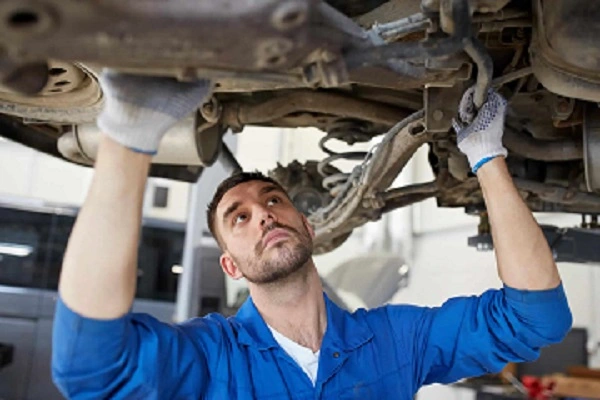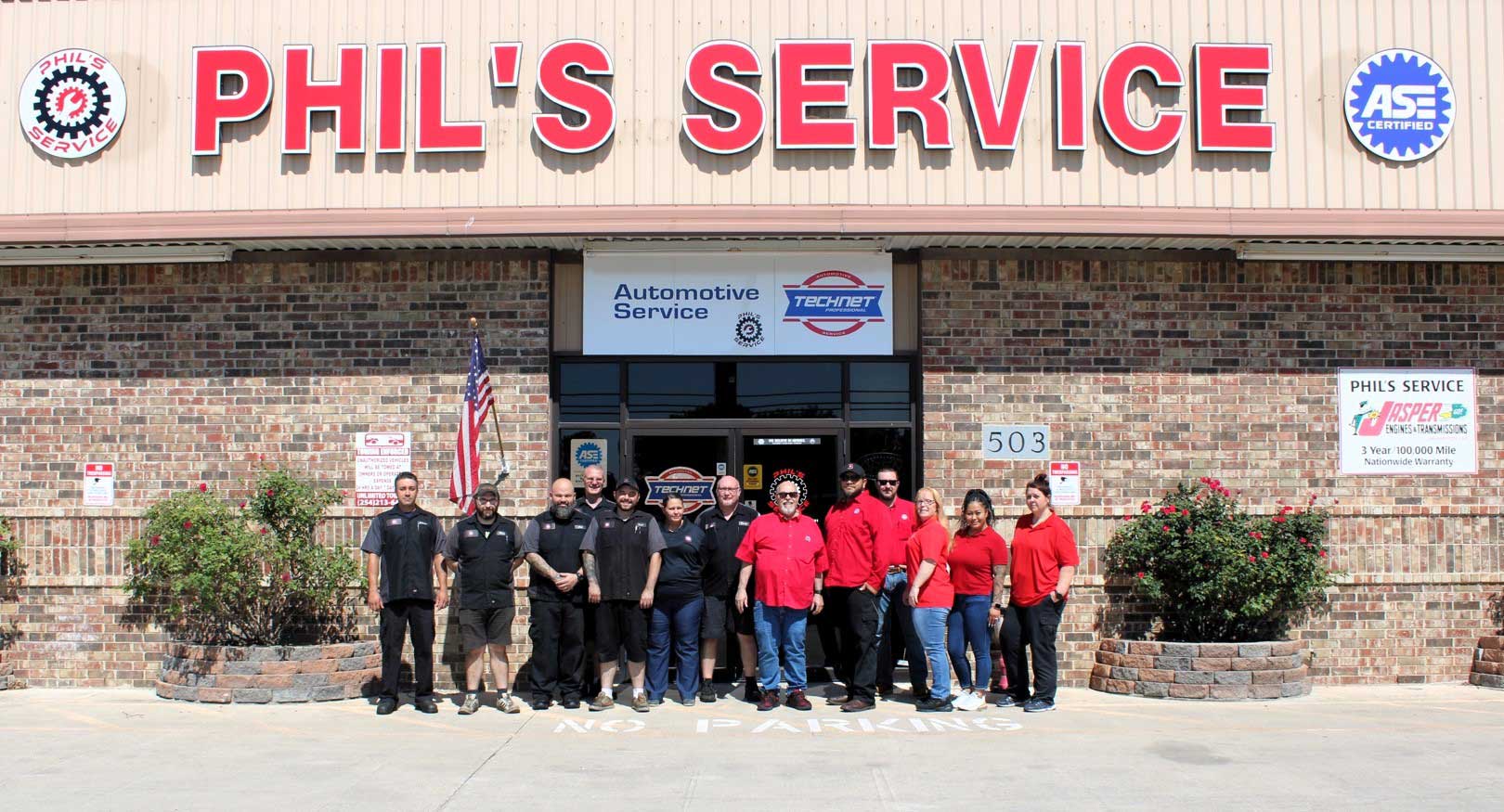Your car, a faithful companion on the road, is designed to run smoothly, purring like a well-tuned engine. However, when an unsettling knocking sound interrupts your time on the road, it can send shivers down any driver's spine.
That mysterious knocking, different from the common car noises you're used to, demands your attention and swift action.
But what's causing the noise? And what should you do about it?
Let's go through the reasons your car is making a knocking sound and what to do about it.
1. Loose or Damaged Connecting Rods
The connecting rods are part of your car's internal combustion process, linking the piston to the crankshaft. If these rods are compromised, it can lead to a distinct knocking noise.
One prevalent cause of connecting rod damage is insufficient lubrication. Like with many of your car components, rods require proper lubrication to work properly. That's why lubrication deficiency is one of the most common vehicle problems.
Detonation, also known as pre-ignition, occurs when the air-fuel mixture starts up before the spark plug.
This can create intense pressure within the combustion chamber, putting strain on the connecting rods. Over time, repeated detonation events can lead to rod damage.
If you suspect damaged connecting rods, avoid driving the vehicle. Continued operation may lead to a catastrophic engine failure, necessitating more extensive repairs. You'll want to get a Killeen auto repair shop to look at your vehicle as soon as possible.
2. Worn Bearings
Bearings rely on proper lubrication to function smoothly. If there is insufficient oil or the oil is degraded, the bearings may experience increased friction and wear. Regular oil changes are necessary for prevention.
Over time, the wear and tear on bearings are natural consequences of the mileage a vehicle accumulates. High-mileage cars are more prone to bearing wear, especially if maintenance has been neglected.
If the bearings are found to be worn, they probably need to be replaced. A skilled mechanic can perform this task, ensuring that the new bearings are properly installed and lubricated.
3. Piston Slap
Another cause of the mysterious knocking noise could be piston slap. Piston slap often results from excessive clearance between the piston and the cylinder walls. This clearance can be caused by factors such as wear and tear, manufacturing tolerances, or thermal expansion.
As the engine reaches operating temperature, the metal components expand, and the clearances decrease. The knocking sound from the piston slap may diminish or become less noticeable as the engine warms up.
Depending on the severity of the piston slap and the overall condition of the engine, a mechanic may recommend you replace your engine. This decision is influenced by factors such as cost, the vehicle's value, and the extent of the damage.
4. Fuel Quality Issues
The quality of the fuel you use plays a crucial role in the engine's performance, and issues with fuel can lead to knocking sounds.
Using fuel with a lower octane rating than recommended for your vehicle can result in knocking. Higher octane fuel is more resistant to premature combustion, and using a lower octane fuel may lead to uncontrolled ignition and the associated knocking noise.
Poor fuel quality often manifests as a knocking sound during acceleration. The noise may be more noticeable under heavy loads or when climbing hills. If you experience knocking under these conditions, it's worth considering the quality of the fuel in your tank.
5. Transmission Problems
The sound could also originate with your transmission.
Low transmission fluid levels or dirty and contaminated fluid can lead to knocking sounds. Your car needs adequate fluid to maintain the lubrication and smooth operation of the transmission components.
Wear and tear on transmission components, such as gears, bearings, or synchronizers, can result in knocking sounds. If your transmission is older, you'll have to be diligent to ensure it's not time for a replacement.
Problems with the torque converter, which transfers power from your car's engine to the transmission, could also be causing the noise. Issues such as worn bearings, damaged fins, or fluid problems within the torque converter can contribute.
One of the most common signs of transmission issues is knocking or clunking sounds, especially when shifting gears. This may indicate problems with the transmission's internal components.
6. Suspension on The Fritz
When the knocking noise is more noticeable when driving over bumps or uneven surfaces, the suspension system could be the culprit.
The suspension system incorporates rubber or polyurethane bushings that dampen vibrations and allow for controlled movement. Over time, they can wear out.
Damaged or worn-out struts and shock absorbers may result in knocking sounds. These components help provide a smooth ride and stabilize the vehicle. If they are compromised, the suspension may make unusual noises.
Look at your suspension, searching for any visible signs of damage, wear, or loose parts. Check for leaking fluid around the shocks or struts.
If you identify loose nuts, bolts, or other components, tighten them to the manufacturer's specifications. However, it's crucial to exercise caution and bring in an auto mechanic if you are not familiar with suspension systems.
7. Exhaust Problems
The exhaust system manages emissions and reduces noise, but problems in this system can lead to various unusual sounds.
Knocking or rattling sounds, particularly during idling or acceleration, are common signs of exhaust-related issues. These sounds may vary in intensity depending on the specific problem.
Look for visible damage, loose heat shields, or any components that appear out of place. Pay attention to rust or corrosion, especially in areas prone to salt or moisture exposure.
Any loose or damaged components need to be repaired or replaced. Heat shields or exhaust hangers could be causing your knocking problem.
If rust or corrosion is evident, take steps to address it. Depending on the severity, this may involve cleaning, treating, or replacing affected components to prevent further deterioration.
If Your Car Is Making a Knocking Sound: Address It Today
If your car is making a knocking sound, there's no time to waste. You'll want to look into local vehicle repair services ASAP.
Are you looking for car maintenance and services in Killeen, TX? Phil's Service is the only ASE Blue Seal Certified repair shop in the city, so it's the right choice for your repair needs.
Get a quote from us today.
Why your car is making a knocking sound? Contact our ASE Certified technicians at Phil's Service shop for vehicle repair services.
Your car, a faithful companion on the road, is designed to run smoothly, purring like a well-tuned engine. However, when an unsettling knocking sound interrupts your time on the road, it can send shivers down any driver's spine.
That mysterious knocking, different from the common car noises you're used to, demands your attention and swift action.
But what's causing the noise? And what should you do about it?
Let's go through the reasons your car is making a knocking sound and what to do about it.
1. Loose or Damaged Connecting Rods
The connecting rods are part of your car's internal combustion process, linking the piston to the crankshaft. If these rods are compromised, it can lead to a distinct knocking noise.
One prevalent cause of connecting rod damage is insufficient lubrication. Like with many of your car components, rods require proper lubrication to work properly. That's why lubrication deficiency is one of the most common vehicle problems.
Detonation, also known as pre-ignition, occurs when the air-fuel mixture starts up before the spark plug.
This can create intense pressure within the combustion chamber, putting strain on the connecting rods. Over time, repeated detonation events can lead to rod damage.
If you suspect damaged connecting rods, avoid driving the vehicle. Continued operation may lead to a catastrophic engine failure, necessitating more extensive repairs. You'll want to get a Killeen auto repair shop to look at your vehicle as soon as possible.
2. Worn Bearings
Bearings rely on proper lubrication to function smoothly. If there is insufficient oil or the oil is degraded, the bearings may experience increased friction and wear. Regular oil changes are necessary for prevention.
Over time, the wear and tear on bearings are natural consequences of the mileage a vehicle accumulates. High-mileage cars are more prone to bearing wear, especially if maintenance has been neglected.
If the bearings are found to be worn, they probably need to be replaced. A skilled mechanic can perform this task, ensuring that the new bearings are properly installed and lubricated.
3. Piston Slap
Another cause of the mysterious knocking noise could be piston slap. Piston slap often results from excessive clearance between the piston and the cylinder walls. This clearance can be caused by factors such as wear and tear, manufacturing tolerances, or thermal expansion.
As the engine reaches operating temperature, the metal components expand, and the clearances decrease. The knocking sound from the piston slap may diminish or become less noticeable as the engine warms up.
Depending on the severity of the piston slap and the overall condition of the engine, a mechanic may recommend you replace your engine. This decision is influenced by factors such as cost, the vehicle's value, and the extent of the damage.
4. Fuel Quality Issues
The quality of the fuel you use plays a crucial role in the engine's performance, and issues with fuel can lead to knocking sounds.
Using fuel with a lower octane rating than recommended for your vehicle can result in knocking. Higher octane fuel is more resistant to premature combustion, and using a lower octane fuel may lead to uncontrolled ignition and the associated knocking noise.
Poor fuel quality often manifests as a knocking sound during acceleration. The noise may be more noticeable under heavy loads or when climbing hills. If you experience knocking under these conditions, it's worth considering the quality of the fuel in your tank.
5. Transmission Problems
The sound could also originate with your transmission.
Low transmission fluid levels or dirty and contaminated fluid can lead to knocking sounds. Your car needs adequate fluid to maintain the lubrication and smooth operation of the transmission components.
Wear and tear on transmission components, such as gears, bearings, or synchronizers, can result in knocking sounds. If your transmission is older, you'll have to be diligent to ensure it's not time for a replacement.
Problems with the torque converter, which transfers power from your car's engine to the transmission, could also be causing the noise. Issues such as worn bearings, damaged fins, or fluid problems within the torque converter can contribute.
One of the most common signs of transmission issues is knocking or clunking sounds, especially when shifting gears. This may indicate problems with the transmission's internal components.
6. Suspension on The Fritz
When the knocking noise is more noticeable when driving over bumps or uneven surfaces, the suspension system could be the culprit.
The suspension system incorporates rubber or polyurethane bushings that dampen vibrations and allow for controlled movement. Over time, they can wear out.
Damaged or worn-out struts and shock absorbers may result in knocking sounds. These components help provide a smooth ride and stabilize the vehicle. If they are compromised, the suspension may make unusual noises.
Look at your suspension, searching for any visible signs of damage, wear, or loose parts. Check for leaking fluid around the shocks or struts.
If you identify loose nuts, bolts, or other components, tighten them to the manufacturer's specifications. However, it's crucial to exercise caution and bring in an auto mechanic if you are not familiar with suspension systems.
7. Exhaust Problems
The exhaust system manages emissions and reduces noise, but problems in this system can lead to various unusual sounds.
Knocking or rattling sounds, particularly during idling or acceleration, are common signs of exhaust-related issues. These sounds may vary in intensity depending on the specific problem.
Look for visible damage, loose heat shields, or any components that appear out of place. Pay attention to rust or corrosion, especially in areas prone to salt or moisture exposure.
Any loose or damaged components need to be repaired or replaced. Heat shields or exhaust hangers could be causing your knocking problem.
If rust or corrosion is evident, take steps to address it. Depending on the severity, this may involve cleaning, treating, or replacing affected components to prevent further deterioration.
If Your Car Is Making a Knocking Sound: Address It Today
If your car is making a knocking sound, there's no time to waste. You'll want to look into local vehicle repair services ASAP.
Are you looking for car maintenance and services in Killeen, TX? Phil's Service is the only ASE Blue Seal Certified repair shop in the city, so it's the right choice for your repair needs.
Get a quote from us today.


